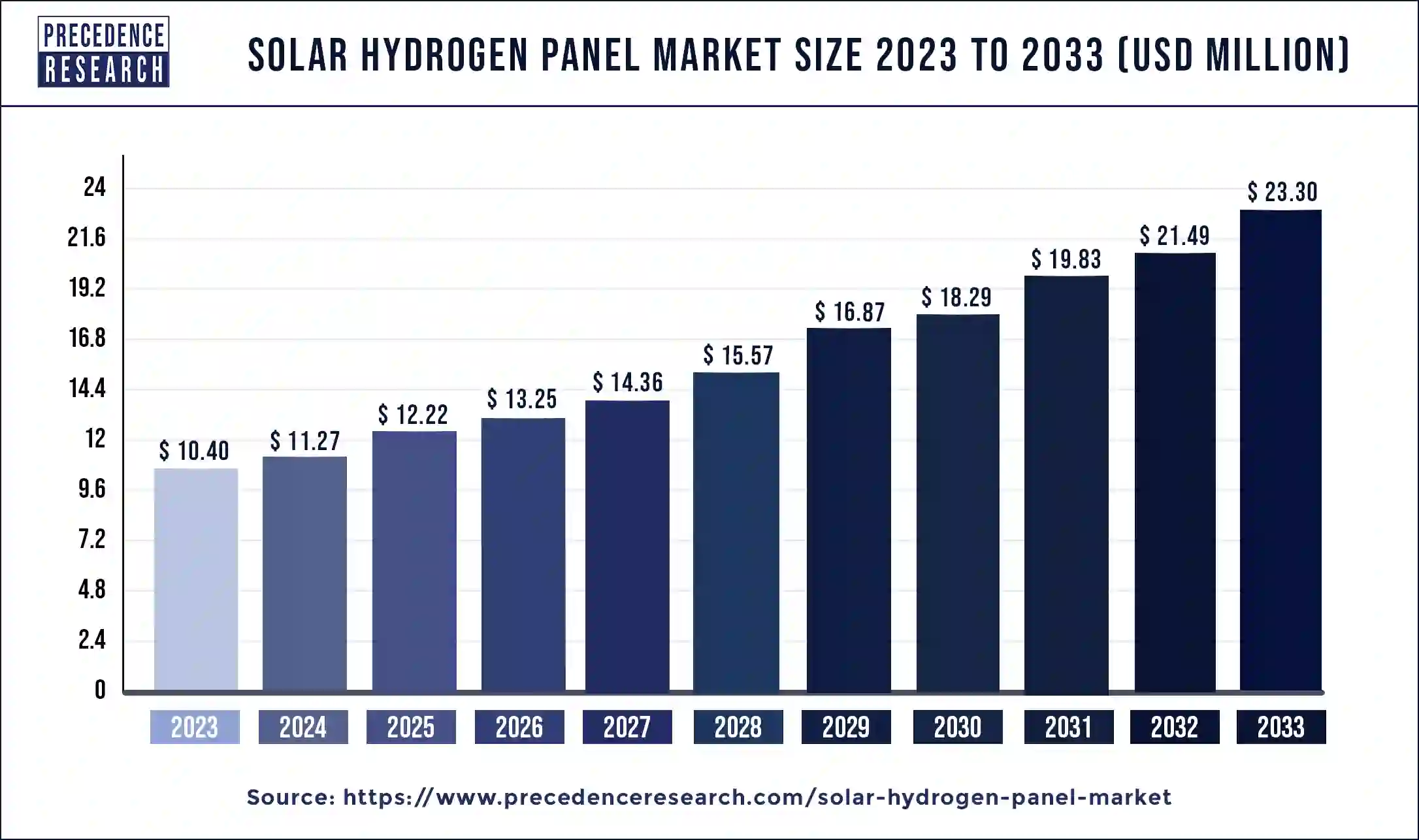- By region, Europe held the largest share of the solar hydrogen panel market with share of 40% in 2023.
- By region, North America is expected to gain a considerable share of the market during the forecast period.
- By technology, the amorphous silicon solar cell segment held the largest share of 65% in 2023 and is expected to continue to do so during the forecast period.
- By end use, the industrial segment holds the largest market share of around 54% in 2023.

The solar hydrogen panel market is a rapidly evolving segment within the renewable energy sector, driven by the increasing global demand for clean and sustainable energy solutions. Solar hydrogen panels, also known as photovoltaic-electrolysis systems or solar-to-hydrogen systems, utilize solar energy to produce hydrogen through the process of electrolysis. This technology represents a promising avenue for achieving carbon-neutral energy production and addressing the challenges associated with climate change and energy transition.
Get a Sample: https://www.precedenceresearch.com/sample/4065
Solar Hydrogen Panel Market Scope
| Report Coverage | Details |
| Growth Rate from 2024 to 2033 | CAGR of 8.40% |
| Global Market Size in 2023 | USD 10.40 Million |
| Global Market Size in 2024 | USD 11.27 Million |
| Global Market Size by 2033 | USD 23.30 Million |
| Largest Market | Europe |
| Base Year | 2023 |
| Forecast Period | 2024 to 2033 |
| Segments Covered | By Technology and By End-use |
| Regions Covered | North America, Europe, Asia-Pacific, Latin America, and Middle East & Africa |
The market for solar hydrogen panels is primarily driven by growing concerns about climate change, air pollution, and the need to reduce greenhouse gas emissions. As countries around the world commit to transitioning towards cleaner energy sources, there is a growing emphasis on renewable hydrogen as a key component of the future energy mix. Solar hydrogen panels offer a sustainable pathway for producing hydrogen without relying on fossil fuels, making them an attractive option for industries, utilities, and transportation sectors seeking to decarbonize their operations.
One of the key advantages of solar hydrogen panels is their ability to harness abundant solar energy resources to produce hydrogen on-site, thereby reducing reliance on centralized hydrogen production facilities and associated transportation costs. This decentralized approach offers flexibility and resilience, allowing users to generate hydrogen locally for various applications, including power generation, industrial processes, fuel cells, and transportation fuels.
Furthermore, advancements in solar photovoltaic (PV) technology, coupled with improvements in electrolysis efficiency and system integration, are driving down the costs of solar hydrogen panels, making them increasingly competitive with conventional hydrogen production methods. As a result, the market for solar hydrogen panels is experiencing rapid growth, with manufacturers, research institutions, and governments investing in research and development to further enhance performance, scalability, and cost-effectiveness.
In terms of regional insights, the market for solar hydrogen panels is witnessing significant activity across various regions, with a particularly strong presence in countries with ambitious renewable energy targets and favorable regulatory frameworks. In Europe, initiatives such as the European Green Deal and the hydrogen strategy aim to accelerate the deployment of renewable hydrogen technologies, including solar hydrogen panels, to support the region’s transition to a carbon-neutral economy.
Similarly, countries in Asia-Pacific, including Japan, South Korea, and Australia, are investing in renewable hydrogen projects, leveraging their abundant solar resources and strong manufacturing capabilities to drive innovation and scale up production. In North America, initiatives such as the U.S. Department of Energy’s Hydrogen Program and state-level policies are supporting the development and deployment of solar hydrogen panels, alongside other clean energy technologies.
Despite the opportunities presented by the growing demand for renewable hydrogen, the solar hydrogen panel market also faces several challenges. One of the primary challenges is the intermittent nature of solar energy, which can affect the reliability and efficiency of hydrogen production. To address this challenge, researchers are exploring energy storage solutions, hybrid systems, and grid integration strategies to ensure stable and continuous hydrogen production.
Additionally, scaling up production and deployment of solar hydrogen panels requires significant investment in infrastructure, manufacturing capacity, and supply chain development. Governments, industry stakeholders, and financial institutions need to collaborate to overcome barriers such as high initial costs, technological barriers, and regulatory uncertainties to unlock the full potential of solar hydrogen panels and accelerate their adoption on a global scale.
Read also: Antibacterial Products Market Size to Touch USD 56.70 Bn by 2033
Recent Developments
- In June 2023, Automated Meteorological Station AWS810 Solar Edition is now available! Vaisala, a leader in meteorological, environmental, and industrial measurements worldwide, announced this today. In order to maximize solar power plant performance and operational efficiency, the IEC-compliant weather station enables the integration of observations of solar irradiance and important meteorological parameters with optional advanced analytics and digital insights.
Solar Hydrogen Panel Market Companies
- Heliogen
- LAVO Hydrogen Technology
- SunHydrogen
- Hydrogenics
- Hyet Solar
- Power to Gas
- Enapter
- Cummins
Segment Covered in the Report
By Technology
- Amorphous silicon solar cells
- Nano solar cells
- Others
By End-use
- Residential
- Industrial
- Mobility
- Others
By Geography
- North America
- Asia Pacific
- Europe
- Latin America
- Middle East & Africa
Contact Us:
Mr. Alex
Sales Manager
Call: +1 9197 992 333
Email: sales@precedenceresearch.com
Web: https://www.precedenceresearch.com
Blog: https://www.expresswebwire.com/
Blog: https://www.uswebwire.com/
